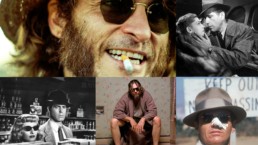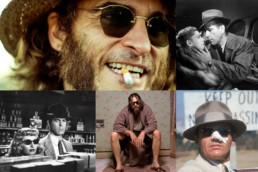The Unique Appeals of the Private Eye Protagonist
An exploration of film noir cinema of old and new and its oftentimes dope detective. Director Paul Thomas Anderson's adaptation is an obvious homage to film noir, and Doc being the film’s fractured, updated take on the hard-boiled detective. Though film noir is often treated as a relic, the genre is thankfully kept alive by neo-noirs like Inherent Vice, and the detective heroes remain as relevant and uniquely appealing as ever. READ MORE...
Doc Sportello, the private eye protagonist of Inherent Vice as played by Joaquin Phoenix, doesn’t look to be the picture of sanity—a frizzy haired, barefoot hippie so often clouded by flumes of marijuana smoke—but he is in the surreal slice of the 70s he occupies. Director Paul Thomas Anderson’s adaptation is an obvious homage to film noir, and Doc being the film’s fractured, updated take on the hard-boiled detective. Though film noir is often treated as a relic, the genre is thankfully kept alive by neo-noirs like Inherent Vice, and the detective heroes remain as relevant and uniquely appealing as ever.
The noir detective, as most of us understand him, began in Raymond Chandler’s stylish Phillip Marlowe novels, and thrived in film as a different kind of American hero. He is a sort of counterpoint to other mythologized American heroes, like the white hats in Westerns. Noir follows the hard-won victories and more often, the hard-lost failures of Humphrey Bogart, rather than the unwavering horseback heroism of John Wayne. Detective tales suggest that American life molds good men not into idealistic heroes but into cold-hearted cynics.
The audience still identifies with the private eye, however, because he isn’t all cynicism. The noir characters of Humphrey Bogart and other actors of his ilk retain shades of idealism. For all their swagger and smart-mouth, the film noir hero could easily be a version of a Jimmy Stewart everyman who surrendered his small-town notions of a righteous world after years spent in a big city lousy with injustice. Bogart has a romantic side in him, as seen in the film adaptation of Chandler’s The Big Sleep, wherein he takes decisive steps to protect Lauren Bacall’s Vivian Rutledge. Though their courtship is anything but traditional, Vivian challenges Phillip’s cynicism and detachment.
••
If a good story is about how the chain of events affect its main character, detective pictures are often about cynical men tricked into exposing a well-hidden core of idealism, until a harsh turn of events forces them to return to cynicism.
Films have to challenge their protagonists and dare them to change, so most detective noirs focus on the cases that coax the steely hero out of his protective shell of cynicism. In most films, our protagonist takes decisive action to change his life, but the noir hero, as a cynic, has to be willed into action by money and is only gradually drawn into his own story by an increasingly surreal case. They are motivated first by money, and then by mystery, and finally by that bit of Stewart-esque idealism the case arouses inside of them—most often by a dame who isn’t all she seems to be.
The most important distinction between noir and other Hollywood fare, both in the 40s and in the present, is in the ending. Most films detail the struggles and eventual triumphs of those who finally take action. The typical Hollywood flick ends happily for the protagonist, thanks to the actions they take. Usually, if a Hollywood character suffers a sad ending, they’ve done something to deserve it, as is the case for Walter Neff (Fred MacMurray) in Double Indemnity, one of the most famous noir films not focused on a private eye. Film noirs reject the idea of happy endings, even for admirable characters. This is a genre wherein the characters are almost inevitably doomed to some sort of misery from the opening credits on. If a good story is about how the chain of events affects its main character, detective pictures are often about cynical men tricked into exposing a well-hidden core of idealism, until a harsh turn of events forces them to return to cynicism.
Take Jake Gittes (Jack Nicholson) in Chinatown, one of the greatest noirs of them all. Gittes follows the mystery and its leads competently for most of the film, but only in the third act does he truly intervene, to save the unusually vulnerable femme fatale, played by Faye Dunaway. He isn’t rewarded for his noble intentions, however, but punished for them, as his implied personal history repeats itself and his intervention leads to further tragedy.
••
Detective stories preach something more cynical and often all too true—no matter how pure our intentions, they can still accomplish nothing, as in Inherent Vice, or worse, result in nothing but misery and tragedy, as in Chinatown.
In Inherent Vice, Doc stumbles upon some kind of conspiracy, but he, like the audience, can never quite put the pieces together, let alone change the course of events or hurt the international syndicate that will soon consume his hippie lifestyle, just like it apparently consumes his old flame Shasta’s identity. While Chinatown suggests Gittes can only make things worse by trying to help, Vice presents Doc as a do-gooder too weak to really affect change or reverse injustice. The Big Lebowski, another pot-heavy neo-noir, lets its lead determine his own destiny. Though he certainly loses something in his struggles to reclaim a soiled rug, The Dude’s (Jeff Bridges) distinct brand of laid-back cynicism means he gets his own sort of happy ending after all, simply by being allowed to continue his life.
Each of these endings flies in the face of traditional Hollywood endings. Most movies preach that taking matters into your own hands will end with love and success, or at the very least some kind of happiness. Detective stories preach something more cynical and often all too true—no matter how pure our intentions, they can still accomplish nothing, as in Inherent Vice, or worse, result in nothing but misery and tragedy, as in Chinatown. The Dude is a rare exception to the rule, but even then, his happiness doesn’t come from action and from change, but simply from being satisfied with where he’s at. The Big Sleep is admittedly another exception to the rule, but I’d argue the movie is weaker for softening the novel’s darker ending.
Private eye protagonists are far from the norm, and that’s certainly not a bad thing since the formula would quickly become tired were that the case. Nevertheless, there are reasons film-goers feel compelled to return, and this tragic brand of American hero will continue to survive in neo-noirs through the times, as long as there’s still something to be cynical about, and something to hope for in spite of it all.
Jeff Rindskopf
Jeff Rindskopf is a contributing writer for CINEMACY.


